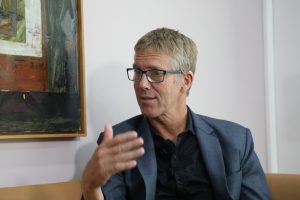‘A 1-week journey’: Wilkinson urges England to seize moment


TOKYO (AP) — The memories are becoming increasingly hazy for Jonny Wilkinson, yet some still jump out.
The day of the Rugby World Cup final in 2003 seemed very long, he recollects. He also recalls the internal battles he had about staying in the moment, and not imagining himself achieving his dream of becoming a world champion with England.
Then, after kicking the winning dropped goal that would change his life, Wilkinson remembers walking around with the Webb Ellis Cup in his hands and “thinking everything is great” — but wishing he could go back into the intense moments of that dramatic game against Australia and do it all over again.
It was a massive team effort from England to win the Rugby World Cup for the first and only time 16 years ago, but Wilkinson will go down as the hero of that night in Sydney, ensuring his status as a national treasure.
Who will be England’s biggest star in the World Cup final against South Africa on Saturday, when the class of 2019 attempt to eclipse the class of 2003?
Will there even be a hero?
“You are so close to arriving, and you want to arrive,” Wilkinson says, in the kind of classic psychoanalysis he has become known for, “but the last thing you ever want to do in life is arrive. I think these guys are on their way somewhere and hopefully right up to the final whistle they are on their way somewhere.”
Many would feel Eddie Jones’ England squad truly arrived on Saturday, when the All Blacks were dismantled like they never really have been before at a World Cup in their 19-7 loss in the semifinals.
It will go down as one of the most complete England performances of all time, up there with the two best displays of the Wilkinson era — the 25-14 win over Australia in Sydney and the 15-13 win over New Zealand in Wellington, both of which came in the lead-up to the 2003 World Cup.
To Wilkinson, that is dangerous.
“It seemed the England team was inspired by an excitement about the unknown and it felt New Zealand, always being the favorites, were a little bit threatened by the unknown,” he says. “The problem is if you start comparing this performance with the last one, you are adding a known in there and think, ‘This is what we’ve got to do, this is where we’ve got to play, we’ve got to get this week to be like last week.’ And it just completely shuts off the potential for a similar performance, which is what you want.”
His advice: “Go out, start again. It’s a one-week journey, not the end of a three-month journey … That game looked for me like a one-off. This game also has to be a one-off.”
Wilkinson, who also played in the 2007 final that England lost to South Africa, was a perfectionist in his playing days, which ended in 2014 when he chose to retire at the age of 35. He has always been a deep and critical thinker and, among other things, he is now a mental-health campaigner.
In Japan, he has watched England’s performances from the comfort of a studio through his role as a TV pundit, but is also trying to give something back to the game that made him famous worldwide.
Wilkinson was the headliner of a “Rugby Introduction Day” held in the suburbs of Tokyo this week in an effort to attract a new generation of Japanese kids to a sport that has only recently become popular in the country. Dozens of kids, aged around 5 and 6, attended a session taught by Wilkinson and other former playing greats like Lawrence Dallaglio, Bryan Habana and Brian O’Driscoll.
Just to the side of Wilkinson, a group of about 10 kids tried to tackle Dallaglio to the ground, and it made the former flyhalf think about what was coming England’s way from the South Africans on Saturday.
“They are a very smothering team — they really get around you and make you feel like there are 20 of them,” said Wilkinson, who was speaking an as ambassador for Land Rover, one of the official Rugby World Cup partners.
“You don’t want to get into an arm wrestle with these guys, like Wales did (in the semifinals),” he said. “It’s very difficult when you are in a tight game to branch out and start getting into a wider game. When you are in a wider game, you can always bring it in. (England) will need to have a balance and variety about their game.”
It’s what the World Cup-winning team of 2003 had, and what the current England squad showed against the All Blacks.
“I think there was a brilliant completeness around it, technically outstanding,” Wilkinson said. “Every player dominated his area of the game in terms of what he’s supposed to do, and there was clarity. You add that together and you get a machine that looks very well-oiled.”






